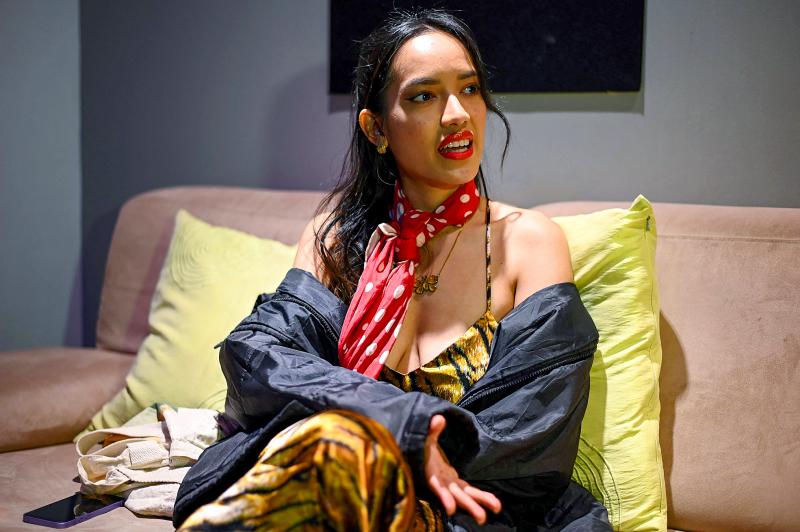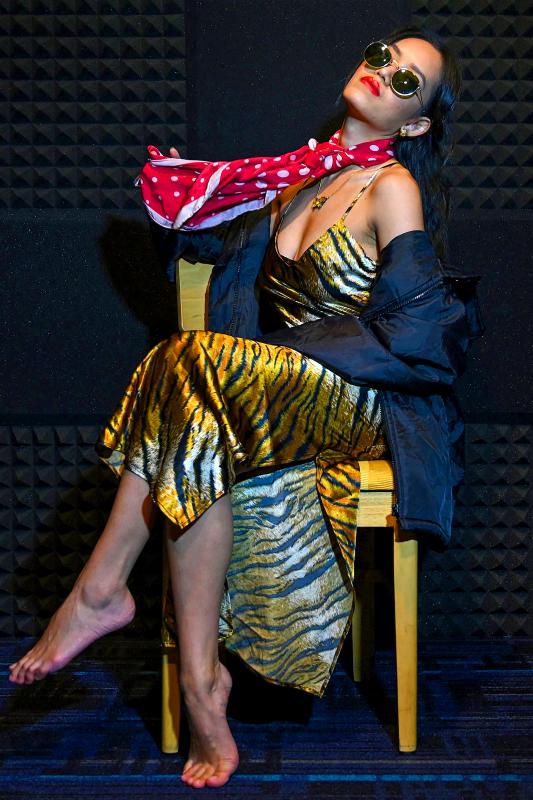Wearing sunglasses and a tiger print dress as she raps into a mic, Malaysian hip-hop artist SYA calls for empowerment while taking a sledgehammer to stereotypes of Muslim women. The first female signing for label Def Jam — the label behind superstars from Jay-Z and Rihanna to BTS and Justin Bieber — in Southeast Asia, her debut single PrettyGirlBop tackles misogyny and acceptance in her Muslim-majority homeland.
“I just want women to feel more comfortable in their own skin,” says SYA, whose long dark hair is uncovered. “I don’t have to pretend to be somebody else just to fit what society deems is good.”
The track, which also features up-and-coming Singapore artist Yung Raja, includes scenes of SYA dressed in white, and stroking a cat wearing a pearl necklace in a lavish bedroom. Underlining her desire that women should not be pigeon-holed, it then switches to her holding a snake and wearing a leopard print jacket, as she defiantly raps: “I wanna be like me.”

Photo: AFP
She is among a crop of young artists from Malaysia, Singapore, Indonesia, Thailand and the Philippines who have been signed by global music giant Def Jam’s Southeast Asian arm. Lauded by the industry as a rising star, the 25-year-old says she faces online abuse from those who believe her behaviour is not appropriate for a young Muslim woman.
“I’ve had a lot of disturbing comments,” the rapper reveals, adding that she has been accused of being a prostitute and had her faith questioned. “’Is she a Muslim? How much per night? Why is she showing so much skin?’”
‘IMPOSTER SYNDROME HIT ME’

Photo: AFP
While Malaysia is a relatively affluent country, society remains largely conservative, with critics saying women’s rights are not sufficiently protected and harassment is common.
SYA says she is facing down the “patriarchal mindset” and “sexualization” of those who don’t conform to the cliched expectations of Muslim women
Most members of Malaysia’s ethnic Malay Muslim community follow a moderate form of the religion and while the majority of women wear a headscarf, there is no law requiring it.
But conservative Islam has been gaining ground, pushed by hardline politicians and preachers, accompanied by growing criticism of any activities and behaviour seen as undermining the faith. For SYA — real name Nur Batrisya Mohammad Nazri — art and religion should be kept firmly separate, however.
“What does (religion) have to do with me as an artist, and what I create?” she said.
The artist, who spent much of her childhood overseas, burst onto the music scene almost by accident when she posted some of her work online, drawing the attention of well-known local rapper SonaOne. He connected her with Def Jam, which had started a push into Southeast Asia, seeking to capitalize on a new wave of regional stars and a youthful demographic with increasing disposable income.
“First and foremost, I consider myself a writer... writing was the reason I am doing all of this... I had never planned to be an artist,” SYA says.
The star confesses she was plagued by “self-doubt” and taken aback by her success. She recalls: “Impostor syndrome really hit me hard. There are other people out there, especially independent artists, who make music 24/7 and are still struggling to get signed.”
‘BE YOUR OWN PERSON’
Growing up, SYA took part in talent shows and listened to artists such as Britney Spears and Michael Jackson.
She later drifted towards hip hop as it was “such an outspoken type of genre.”
Her parents are “getting used to the idea” of her becoming a star, she said, adding that her mum was her “biggest supporter.”
After months of only doing online shows due to a lengthy coronavirus shutdown in Malaysia, she now plans to return to live performing. SYA has yet to run into trouble with authorities but artists regularly do in Malaysia.
Rapper Namewee, from the country’s ethnic Chinese minority, relocated to Taiwan after controversy over videos he made that critics allege insult Islam. Despite this, SYA still thinks male artists have far more freedom to rap about sensitive subjects in the conservative country without fear of being criticised. “For the boys, there are no limitations. If they want to rap about sex or weed, it is a pass,” she said. “But for women, if you are Malay, you don’t want to insinuate you are doing all of those things.”
SYA hopes her music inspires other women — not to emulate her, but to be more confident in themselves. “I don’t want to be the perfect role model,” she said. “You can take inspiration from me [to] be your own person.”

The primaries for this year’s nine-in-one local elections in November began early in this election cycle, starting last autumn. The local press has been full of tales of intrigue, betrayal, infighting and drama going back to the summer of 2024. This is not widely covered in the English-language press, and the nine-in-one elections are not well understood. The nine-in-one elections refer to the nine levels of local governments that go to the ballot, from the neighborhood and village borough chief level on up to the city mayor and county commissioner level. The main focus is on the 22 special municipality

In the 2010s, the Communist Party of China (CCP) began cracking down on Christian churches. Media reports said at the time that various versions of Protestant Christianity were likely the fastest growing religions in the People’s Republic of China (PRC). The crackdown was part of a campaign that in turn was part of a larger movement to bring religion under party control. For the Protestant churches, “the government’s aim has been to force all churches into the state-controlled organization,” according to a 2023 article in Christianity Today. That piece was centered on Wang Yi (王怡), the fiery, charismatic pastor of the

Hsu Pu-liao (許不了) never lived to see the premiere of his most successful film, The Clown and the Swan (小丑與天鵝, 1985). The movie, which starred Hsu, the “Taiwanese Charlie Chaplin,” outgrossed Jackie Chan’s Heart of Dragon (龍的心), earning NT$9.2 million at the local box office. Forty years after its premiere, the film has become the Taiwan Film and Audiovisual Institute’s (TFAI) 100th restoration. “It is the only one of Hsu’s films whose original negative survived,” says director Kevin Chu (朱延平), one of Taiwan’s most commercially successful

The People’s Republic of China (PRC) invaded Vietnam in 1979, following a year of increasingly tense relations between the two states. Beijing viewed Vietnam’s close relations with Soviet Russia as a threat. One of the pretexts it used was the alleged mistreatment of the ethnic Chinese in Vietnam. Tension between the ethnic Chinese and governments in Vietnam had been ongoing for decades. The French used to play off the Vietnamese against the Chinese as a divide-and-rule strategy. The Saigon government in 1956 compelled all Vietnam-born Chinese to adopt Vietnamese citizenship. It also banned them from 11 trades they had previously